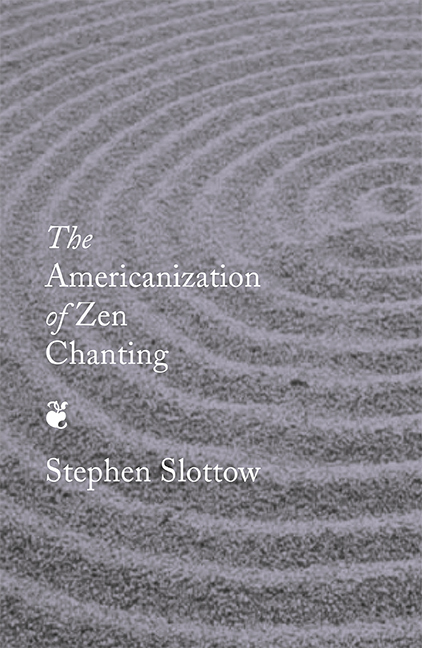Book contents
- Frontmatter
- Contents
- List of Examples
- Acknowledgements
- Chapter 1 Introduction
- Chapter 2 Purposes and Functions of Zen Chanting
- Chapter 3 Performance Practice
- Chapter 4 Typology, Translation, and Ceremonies
- Chapter 5 Conclusion
- Bibliography
- Discography and Videography
- Appendix: Alternative Chant Names
- Index
Chapter 1 - Introduction
- Frontmatter
- Contents
- List of Examples
- Acknowledgements
- Chapter 1 Introduction
- Chapter 2 Purposes and Functions of Zen Chanting
- Chapter 3 Performance Practice
- Chapter 4 Typology, Translation, and Ceremonies
- Chapter 5 Conclusion
- Bibliography
- Discography and Videography
- Appendix: Alternative Chant Names
- Index
Summary
The introduction of Zen Buddhism (as opposed to Buddhism in general) to North America is generally agreed to date from 1893, when the Rinzai master Sōen Shaku (then Roshi of Engakuji) participated in the World Parliament of Religions in Chicago. Two of his students, Daisetz Teitaro Suzuki and Nyogen Senzaki, were to become strongly influential, in very different ways, in the subsequent history of Zen in America. However, it wasn't until the “Zen boom” of the 1950s and 60s that the word Zen entered American popular consciousness in a major and inescapable way. It has since been applied to everything from religious practice to interior decorating to fashion to bowel movements (admittedly an extreme example).
As regards Western music, Zen Buddhism has influenced jazz musicians such as Keith Jarrett (Liddell n.d.), and has been ubiquitous in New Age, ambient, and “mood” music, where it continues to be used as a slightly faded exotic synonym for “relaxation” (Mott 1985). In Western art music in particular, it has been invoked by performers, composers—most notably John Cage—and even by some music theorists, such as Robert Snarrenberg (1992) and Kristen Taavola (1997). Japanese contemporary composers such as Tôru Takemitsu and Yuasa Jōji have been influenced by Zen Buddhist ideas—not, however, so much through direct contact or practice as indirectly through John Cage for Takemitsu (Sakamoto 2010, 12-13), and the writings of D.T. Suzuki, for Jōji (Galliano 2002, 14). It has also strongly influenced Japanese traditional music, especially for the shakuhachi, the ritual instrument of the Fuke sect of Zen, even after the sect was officially abolished in 1871 (Tsukitani 2008, 146).
In most of these musical contexts, Zen has been largely cut off from its moorings as a religious practice and used to refer to a type of aesthetic, philosophy, or style. However, what has been somewhat overlooked is that Zen Buddhist practice has, so to speak, its own indigenous music: the ritual chanting which, along with bells and other percussion instruments, form a part of virtually every Zen ceremony and formal event, both monastic and lay, and which could be regarded as the liturgical or ritual music of Zen Buddhism.
- Type
- Chapter
- Information
- The Americanization of Zen Chanting , pp. 1 - 6Publisher: Boydell & BrewerPrint publication year: 2018



